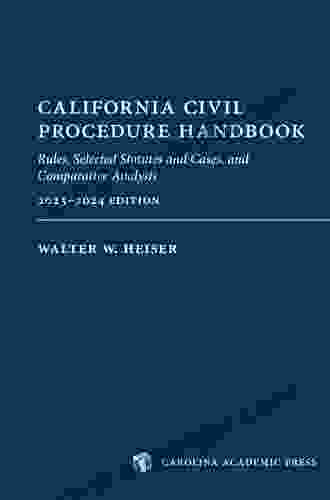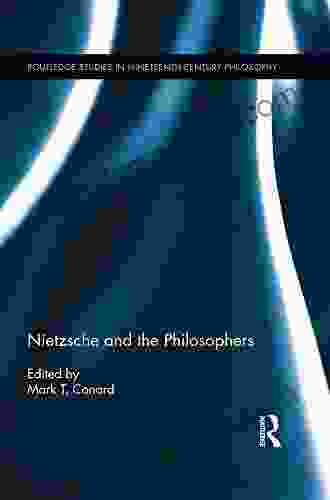Nietzsche and the Philosophers: A Routledge Study of the 19th Century

Friedrich Nietzsche was one of the most influential philosophers of the 19th century. His work has had a profound impact on subsequent thought, and he continues to be a source of inspiration and controversy today.
5 out of 5
| Language | : | English |
| File size | : | 2341 KB |
| Text-to-Speech | : | Enabled |
| Screen Reader | : | Supported |
| Enhanced typesetting | : | Enabled |
| Word Wise | : | Enabled |
| Print length | : | 305 pages |
In this book, we explore Nietzsche's influence on 19th-century philosophy. We examine his relationships with Schopenhauer, Wagner, and other thinkers, and we trace the development of his own ideas over time.
We argue that Nietzsche's work is best understood as a response to the crisis of modernity. He saw the 19th century as a time of great upheaval and change, and he believed that traditional values and beliefs were no longer adequate to meet the challenges of the new age.
Nietzsche's philosophy is a radical critique of modernity. He rejects the Enlightenment's faith in reason and progress, and he argues that the true nature of reality is irrational and chaotic. He also attacks Christianity, which he sees as a religion of weakness and ressentiment.
Nietzsche's philosophy is not for the faint of heart. It is a difficult and challenging body of work, but it is also one of the most important and influential philosophies of the last two centuries.
Nietzsche and Schopenhauer
Nietzsche's relationship with Schopenhauer was complex and ambivalent. On the one hand, Nietzsche admired Schopenhauer's pessimism and his rejection of the Enlightenment. On the other hand, he criticized Schopenhauer's asceticism and his belief in the primacy of the will.
Nietzsche's early work, such as The Birth of Tragedy, shows the strong influence of Schopenhauer's thought. However, in his later work, Nietzsche increasingly moved away from Schopenhauer's pessimism and asceticism. He came to believe that the will to power, not the will to live, is the fundamental driving force of human nature.
Nietzsche and Wagner
Nietzsche's relationship with Wagner was even more complex and ambivalent than his relationship with Schopenhauer. Nietzsche first met Wagner in 1868, and he was immediately impressed by Wagner's music and his philosophy. He became a close friend and supporter of Wagner, and he even wrote a book, The Case of Wagner, in which he praised Wagner's genius.
However, Nietzsche's relationship with Wagner began to deteriorate in the early 1870s. Nietzsche became increasingly critical of Wagner's music and his philosophy. He also came to believe that Wagner was using him for his own purposes.
In 1876, Nietzsche published a devastating critique of Wagner, entitled Twilight of the Idols. In this work, Nietzsche attacked Wagner's music as "effeminate" and "decadent." He also accused Wagner of being a "charlatan" and a "false prophet."
Nietzsche and the Other Philosophers
Nietzsche's work also had a significant impact on other 19th-century philosophers. Kierkegaard, Heidegger, and Sartre were all influenced by Nietzsche's thought.
Kierkegaard was a Danish philosopher who lived in the 19th century. He was a profound influence on Nietzsche, and his work on the nature of existence and the meaning of life had a significant impact on Nietzsche's own thought.
Heidegger was a German philosopher who lived in the 20th century. He was also influenced by Nietzsche, and his work on the nature of being and the meaning of Dasein was influenced by Nietzsche's own thought.
Sartre was a French philosopher who lived in the 20th century. He was also influenced by Nietzsche, and his work on the nature of freedom and the meaning of existence was influenced by Nietzsche's own thought.
Nietzsche's work is a complex and challenging body of thought, but it is also one of the most important and influential philosophies of the last two centuries. His work has had a profound impact on subsequent thought, and he continues to be a source of inspiration and controversy today.
In this book, we have explored Nietzsche's influence on 19th-century philosophy. We have examined his relationships with Schopenhauer, Wagner, and other thinkers, and we have traced the development of his own ideas over time.
We have argued that Nietzsche's work is best understood as a response to the crisis of modernity. He saw the 19th century as a time of great upheaval and change, and he believed that traditional values and beliefs were no longer adequate to meet the challenges of the new age.
Nietzsche's philosophy is a radical critique of modernity. He rejects the Enlightenment's faith in reason and progress, and he argues that the true nature of reality is irrational and chaotic. He also attacks Christianity, which he sees as a religion of weakness and ressentiment.
Nietzsche's philosophy is not for the faint of heart. It is a difficult and challenging body of work, but it is also one of the most important and influential philosophies of the last two centuries.
5 out of 5
| Language | : | English |
| File size | : | 2341 KB |
| Text-to-Speech | : | Enabled |
| Screen Reader | : | Supported |
| Enhanced typesetting | : | Enabled |
| Word Wise | : | Enabled |
| Print length | : | 305 pages |
Do you want to contribute by writing guest posts on this blog?
Please contact us and send us a resume of previous articles that you have written.
 Book
Book Novel
Novel Page
Page Chapter
Chapter Text
Text Story
Story Genre
Genre Reader
Reader Library
Library Paperback
Paperback E-book
E-book Magazine
Magazine Newspaper
Newspaper Paragraph
Paragraph Sentence
Sentence Bookmark
Bookmark Shelf
Shelf Glossary
Glossary Bibliography
Bibliography Foreword
Foreword Preface
Preface Synopsis
Synopsis Annotation
Annotation Footnote
Footnote Manuscript
Manuscript Scroll
Scroll Codex
Codex Tome
Tome Bestseller
Bestseller Classics
Classics Library card
Library card Narrative
Narrative Biography
Biography Autobiography
Autobiography Memoir
Memoir Reference
Reference Encyclopedia
Encyclopedia Kathryn E Scarborough
Kathryn E Scarborough Dorriah Rogers
Dorriah Rogers Carlos Magdalena
Carlos Magdalena John Wackman
John Wackman Michael L Eads
Michael L Eads Novella Carpenter
Novella Carpenter Charles C Bolton
Charles C Bolton Chad A Haag
Chad A Haag Pamela Holberton
Pamela Holberton Jonathan Gawne
Jonathan Gawne Souvik Pal
Souvik Pal Cara Whitney
Cara Whitney Charles D Smith
Charles D Smith Carol E H Scott Conner
Carol E H Scott Conner Cassie Hatcher
Cassie Hatcher Carlos R Smith
Carlos R Smith Candy Arrington
Candy Arrington Celeste Lacuna Richman
Celeste Lacuna Richman Michael C Mackey
Michael C Mackey Carter Buschardt
Carter Buschardt
Light bulbAdvertise smarter! Our strategic ad space ensures maximum exposure. Reserve your spot today!

 Joel MitchellUnveiling the Essential Guide to California Civil Procedure: A Comprehensive...
Joel MitchellUnveiling the Essential Guide to California Civil Procedure: A Comprehensive... Michael CrichtonFollow ·9k
Michael CrichtonFollow ·9k Ibrahim BlairFollow ·9.6k
Ibrahim BlairFollow ·9.6k Anton FosterFollow ·8.6k
Anton FosterFollow ·8.6k Boris PasternakFollow ·14.7k
Boris PasternakFollow ·14.7k Floyd PowellFollow ·16.8k
Floyd PowellFollow ·16.8k Jack LondonFollow ·11.9k
Jack LondonFollow ·11.9k Carl WalkerFollow ·7k
Carl WalkerFollow ·7k Chase SimmonsFollow ·13.2k
Chase SimmonsFollow ·13.2k

 Henry Hayes
Henry HayesVery Short Introductions: A Gateway to Knowledge...
In the realm of academia, where vast oceans of...

 Jean Blair
Jean BlairBorn on the Third of July: An Unforgettable Journey of...
Born on the Third...

 Benjamin Stone
Benjamin StoneEnvironmental Offsets: Striking a Balance between...
In the face of pressing environmental...

 Colin Foster
Colin FosterGirl With Power: My Boyhood Bully Diary
In this gripping and...

 Colin Foster
Colin FosterUnveiling the Unseen: The Collected Works of Charles Fort
Prepare to venture into...

 Gabriel Mistral
Gabriel MistralUnveiling the Hidden World of the English Republican...
Dive into the captivating world of 'The...
5 out of 5
| Language | : | English |
| File size | : | 2341 KB |
| Text-to-Speech | : | Enabled |
| Screen Reader | : | Supported |
| Enhanced typesetting | : | Enabled |
| Word Wise | : | Enabled |
| Print length | : | 305 pages |










